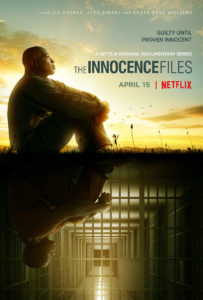Series Review: “The Innocence Files” Packs a Powerful, Righteous Punch
Written by: Christopher Llewellyn Reed | April 15th, 2020

The Innocence Files (Sarah Dowland/Liz Garbus/Alex Gibney/Andy Grieve/Jed Rothstein/Roger Ross Williams, 2020) 3½ out of 4 stars.
A monumental cinematic exploration of judicial wrongs made right (or as right as injustice can be made), Netflix’s new nine-episode documentary series The Innocence Files examines the myriad ways in which the forces of law and order emphasize neither in their quest for convictions at all costs. Six directors, among them Liz Garbus (What Happened, Miss Simone?), Alex Gibney (Citizen K) and Roger Ross Williams (The Apollo) – all three of whom also executive produced – pursue disturbing tales of prosecutorial overreach across three themed sections entitled “The Evidence,” “The Witness” and, pointedly, “The Prosecution.” Sure to rile emotions on both sides of the issue (though how one could be for violation of civil rights and shoddy detective work, I do not know), the series gains increasing potency over the course of its almost nine-and-a-half-hour running time, each sequence further building a cumulative case for the urgent need for criminal-justice reform. What value has democracy and freedom without accountability, after all?
For there is one recurring motif, over and over: without consequences for their actions, police and district attorneys who break the law and/or cut corners in pursuit of courtroom wins will never stop. Time and again, we hear about the dangers of tunnel vision, whereby early conclusions about guilt lead to the gathering of clues that only support those conclusions, ignoring exculpatory evidence. Flawed scientific practices – such as the questionable forensics of bite marks – are touted as proof, even today after subsequent DNA testing vacates verdicts reached using their problematic methods. It’s a continuing toxic cycle of ambition, corruption and unchecked power wielded over those – usually the poor, and often people of color – who cannot defend themselves. Welcome to the United States of Brutality.

Fortunately, the falsely accused and imprisoned have advocates in their camp, both local defense attorneys and members of The Innocence Project, a national organization founded in 1992 by Peter Neufeld and Barry Scheck, with regional offices throughout the land. Unfortunately, so many people write to these committed lawyers that there is no possible way they can attend to all cases. First, they must sift through the details of each situation, determining for themselves the validity of the claim. Then they must decide if there is enough potential new evidence to warrant a new appeal (in the form of a writ of habeas corpus). After that, it can still take years to free the innocent. And those are the lucky ones.
Methodically, bit by bit, each director – Sarah Dowland, Andy Grieve (Can’t Stand Losing You: Surviving the Police) and Jed Rothstein (The China Hustle) round out the team – walks us through the particulars of their respective protagonists, revealing why they ended up in prison and how, decades later (in most instances), they got out. Whether we are in Mississippi, following the incarcerations of Levon Brooks and Kennedy Brewer (Episodes 1 and 2); Virginia, with that of Keith Harward (Episode 3); California, for Franky Carrillo (Episodes 4 and 5); Virginia, again, for Thomas Haynesworth (Episode 6); Pennsylvania, for Chester Hollman (Episode 7); Louisiana, for Alfred Dewayne Brown (Episode 8); or Michigan, for Ken Wyniemko, we are offered a dispiriting glimpse at our juridical dystopia (though tinged with hope, however bittersweet). Though the series can sometimes overwhelm through minutia, it always pulls us back in with the raw emotions of each person’s story. Scripted courtroom dramas cannot touch it in the strength of its narrative punch, for this is the real deal.


